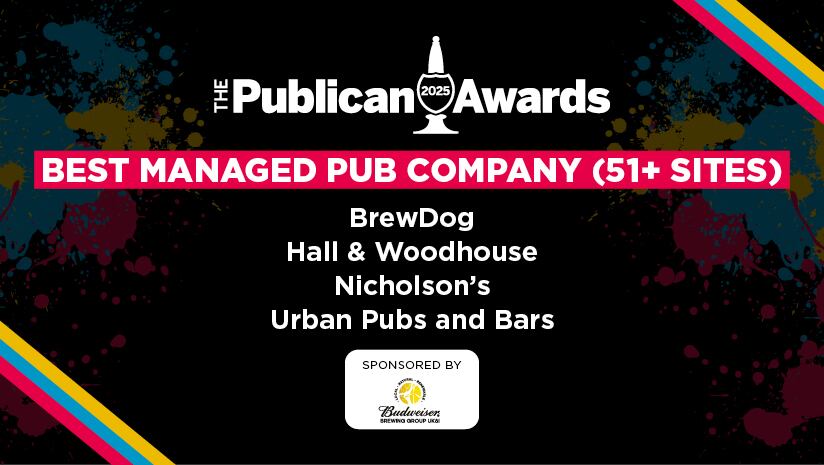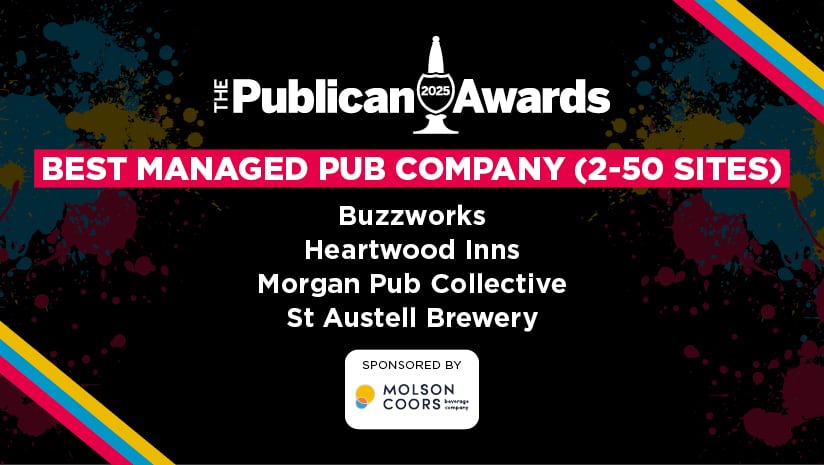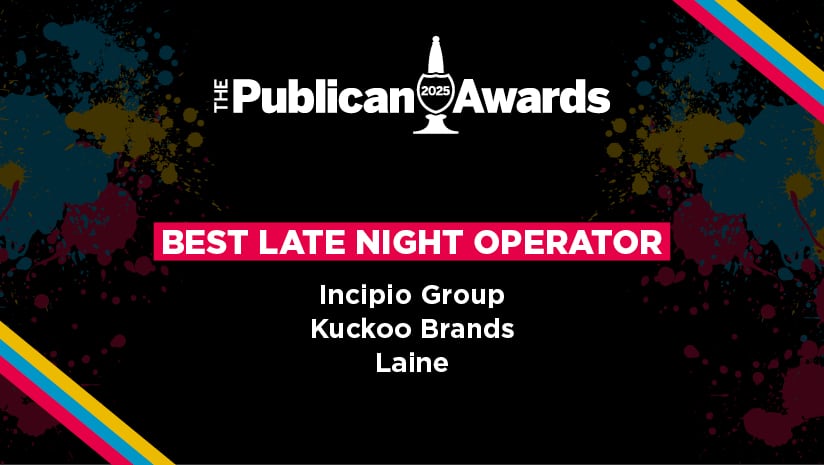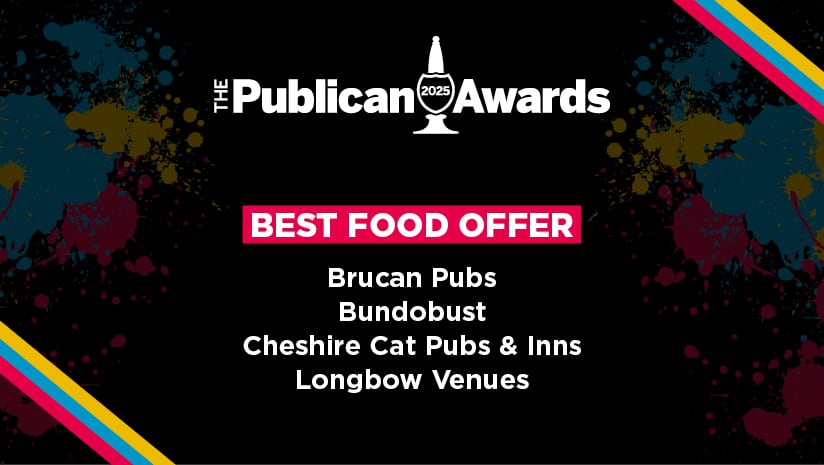BrewDog
With its mission to bring ‘craft beer for all’, BrewDog’s bars have sprung up in towns and cities across the UK (and, indeed, the world) since the first opened in Aberdeen in 2010, and it continues to evolve its offer, keeping pace with a fast-changing market.
The opening of BrewDog Waterloo in 2022 marked a spectacular step-change for the company in extending its customer base into the family audience in a venue that is leaning towards a full-scale leisure complex – though the on-site microbrewery is evidence that beer remains centre-stage.
Elsewhere around the estate, environments have been softened and new backbars and tapwalls installed. There’s been a growing emphasis on food with its wings, burgers and pizza menu, and on cocktails, too. More attention is also being given to positioning the bars more effectively in their local communities.
As we’ve come to expect, BrewDog’s great flair is for marketing, and it continues to come up with imaginative eye-catching campaigns, partnering with Warner Brothers, for instance, on a Friends-themed pub quiz that culminated in a trip to New York for the winners. And you can’t miss the bright point-of-sale promoting sales in every site.
The company’s operations team is very close to the ground, spending most of their time working in the bars, and alongside having that support at hand each site has a dedicated ‘Guide Dog’ trainer responsible for maintaining consistent standards, pushing through the latest initiatives and troubleshooting any problems.
BrewDog has long been known for its training, especially in beer, and more recently a lot of effort has been going into improving communications with and engaging its young workforce and generally looking after its people and improving efficiencies throughout the operation.
The results of all this are already being seen in staff retention and profitability as the company embarks on the next chapter of its story.
Hall & Woodhouse
Founded in 1777, Hall & Woodhouse is a family brewer that’s clearly in it for the long term. But that hasn’t prevented it from moving quickly in the past couple of years in adapting its 54-strong managed house operation in southern England to the demands of modern times.
The company has set itself some tough targets to achieve an inspiring turnaround through a strong emphasis on developing its people, making sure they give guests the best possible experience and driving spend per head.
It has also quietly enhanced its estate over the past decade, churning and lifting the quality of its existing pubs and partnering with developers to establish large venues on new housing estates where there is undoubted demand for a pub that can deliver an all-round all-day service.
General managers are supported in taking initiatives to continuously improve their business and are encouraged to spend most of their time alongside their teams, leading rather than being stuck in the office, and they play a big part in driving brand standards.
Famously, Hall & Woodhouse directors tour the whole estate in the run-up to Christmas checking on the quality of the roast potatoes. It’s a bit of fun – but reflects a genuine seriousness about getting it right.
Food has received special attention in the past year. Three different menus operate across the estate and the total number of dishes and the skills required to produce them have been reduced in order to enhance GPs and ease pressures on kitchen staffing – and the guests seemed to have enjoyed eating at Hall & Woodhouse all the more.
On the bar, its famous Badger ales are now joined by beers from the company’s craft arm, Outland, and the coffee station takes a prominent position reflecting its all-day aspirations.
Hall & Woodhouse may be a traditional company, but it is harnessing those traditional values to show how pubs can successfully evolve.
Nicholson’s Inns
Part of the Mitchells & Butlers hospitality empire, Nicholsons Inns is probably best known for its collection of 81 historic pubs in London and other cities across the UK. But there’s a lot more to it than beautiful bricks and mortar - the group is leading the way in showing just how profitable traditional wet-led pubs can be.
A remodelling programme is underway across the estate that aims to make the most of trading areas and improve service to customers, while a drive to raise retail standards has lifted the operation into a more premium position. Every pub, for instance, now scores five stars in the Beer Marque cellar audits.
At the heart of the Nicholson’s success story are a loyal group of well-incentivised general managers with an average length of service exceeding 12 years who are encouraged to feel the business is their own.
They have responsibility for identifying and promoting talent and they have a say, too, in choosing the beers that will go down best with their guests, mostly a mix of local office workers and tourists looking for that quintessential pub experience. Gin is the other main drinks focus, and every back-bar features an eye-catching range.
Food has been a focus, lately, and the new sandwich menu has proved a popular daytime alternative to the brand’s famous pies, while snacks and sharing plates have also been a winner. And Nicholson’s has sought to diversify its offer further at selected sites by introducing sports on screen and live music, driving more footfall.
On the people side, pub staff are now armed with a social media app called Dish which has improved communications and engagement across the organisation, while four diversity and inclusion networks aim to ensure everyone feels valued.
In summary, Nicholson’s is a solid and successful operation that’s making the most of Britain’s pub heritage.
Urban Pubs & Bars
Founded a decade ago, Urban Pubs & Bars has fast become a leading player on the London pub scene with 54 sites around the capital – and counting.
It’s a diverse estate, ranging from traditional pubs and late-night destinations to the Salt Yard tapas bars and the Bat & Ball experiential venues, and the company insists on each site developing its own individual character through unleashing the entrepreneurial spirit of its general managers. But they all have in common a special energy and high standards of service to their customers.
Urban has above all proved its ability to open new sites at pace without compromising on quality nor on serious levels of investment that have, in particular, revived some run-down heritage properties.
Developing a pipeline of talent that can sustain the Urban culture is perhaps the group’s biggest test, and it’s rising to that challenge in its own way. Key to that are the ‘Urbanistas’ based at each site, people who have bought into the company’s vision and values and are charged with identifying team members who can progress and making sure they have the coaching they need. Staff retention rates have doubled as a result.
Also important is an operations team that is constantly moving the business on by working closely with GMs and their staff, attending to the details that can make or break a venue.
If Urban has one identifying signature across all its outlets, it’s the spectacular towering back-bar displays, signalling a place that’s serious about its drinks, from cocktails to cask and craft beers. Yet food is a big part of the mix at most sites with head chefs enjoying the freedom to develop their own menus of freshly cooked dished, supported across the estate by five executive chefs.
With much more to come, Urban must rank as one of the most exciting operators around.




